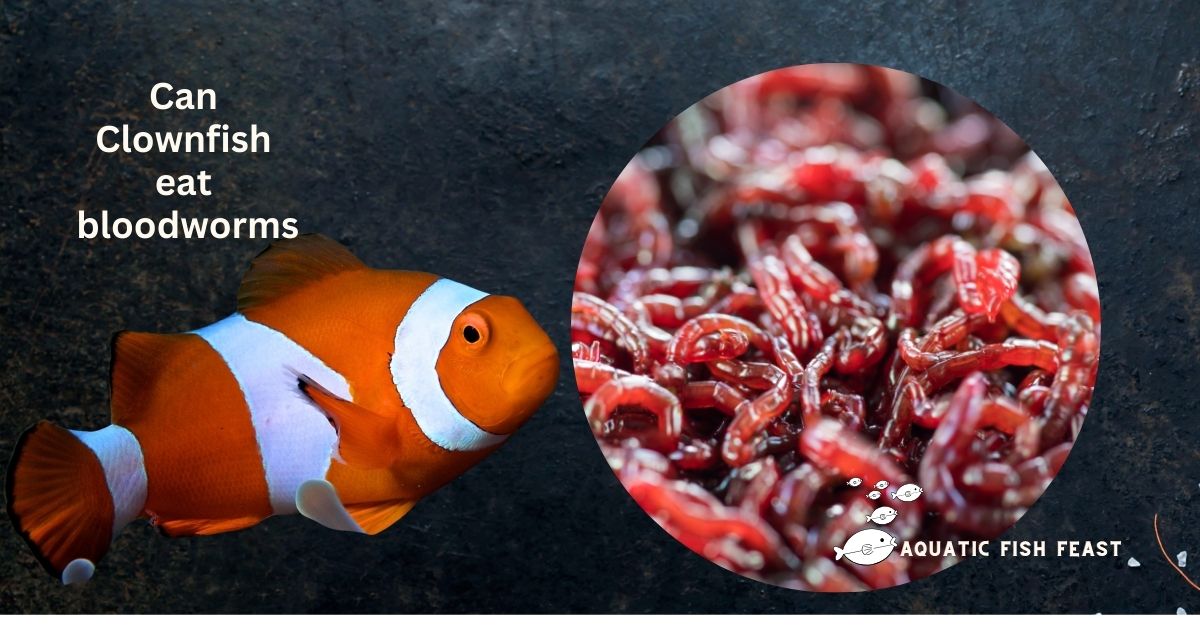Can Clownfish eat bloodworms? Yes. Whatever you feed your clowns will be delicious, in my experience. The ideal way to feed fish is with various foods; sometimes, they are given blood worms.
Whole, freeze-dried shrimp, cyclops-size, and algae flakes or sheets are my favorite clown foods.
In any case, the fish species you maintain in your aquarium. If they even have a mild meat-eating proclivity, the bloodworms will not match them.
Pet stores sell them widely, and small red larvae are frequent. According to many aquarists, pet carnivorous fish provide nutrition and energy.
Before adding bloodworms to your aquarium, consider these questions. Do you know which is better for aquatic pets?
This article covers clownfish eating bloodworms in detail.
Now, let’s get started.
Table of Contents
Can Clownfish eat bloodworms
Yes, Clownfish can eat small amounts of bloodworms. However, they should not be fed bloodworms every day.
At some point, bloodworms could be bad for clownfish when they eat them often for their balanced diet.
This is because they can not have the essential nutrients, minerals, vitamins, and proteins they need to absorb food properly, eating bloodworms as their basic food.
Good flake meals and pellets can give fish protein, but they don’t have other nutrients that fish need.
Because of this, kids need a diet with many different kinds of food. Additionally, giving kids only the best, healthiest things is very important. When you feed Clownfish, you can give them live or frozen bloodworms.
It’s important to know that bloodworms aren’t usually eaten. The way clownfish process food is different from other fish.
The stuff they eat goes straight to their bowels because they don’t have stomachs.
You need to ensure they eat right so they don’t get clogs or constipation.
What are the Types of bloodworms that feed Clownfish
Foods that are frozen, live, and freeze-dried are often used. Bloodworms are typically fed to freshwater fish, although they can be consumed by any fish that consumes both plant and meat.
Bloodworms are more frequently offered frozen. These can be enjoyed as a treat by Clownfish and other ocean fish.
These bloodworms are given diets rich in vitamins and minerals until they become large and fatty; at this point, they are frozen just before they explode.
This guarantees they get the maximum amount of protein.
Most of the blocks or sheets frozen bloodworms are made of water, which is an issue.
Placing the frozen blocks in the tank without thawing them beforehand might contaminate a tiny fish tank.
It’s preferable to thaw frozen food before giving it to your fish.
If you don’t let it thaw, your Clownfish may find it challenging to consume and have digestive trouble.
Are too many bloodworms bad for clown fish
The number of bloodworms you feed your aquarium’s fish will depend on their size and number.
It would be beneficial to avoid giving fish more food than they can eat in three minutes, as this might taint the water and harm the fish.
But it may be different from how things work in practice. Sometimes, bloodworms might be bad for your fish’s diet.
Since they might be contaminated with deadly bacteria and viruses that affect fish, bloodworms obtained in the wild provide a number of health risks.
Feeding your fish bloodworms too regularly or excessively is not a good idea.
This is because, despite its abundance of protein, bloodworms lack a number of vital vitamins, minerals, and other substances that fish need.
As such, do not use bloodworms as your primary food source; instead, incorporate them into a regular but diversified diet.
Given its high-fat content, bloodworms are best taken once a week.
If you are training for breeding, I have always recommended Artemia since it is less “fatty” and still high in protein.
Do bloodworms enhance clownfish color
Giving carnivorous fish brine crabs and bloodworms can boost their color.
Remember that brine shrimp and bloodworms are treats or supplements, not part of a balanced diet.
Giving carnivorous fish brine crabs and bloodworms can boost their color.
Remember that brine shrimp and bloodworms are treats or supplements, not part of a balanced diet.
For healthy fish, you can also as well give them bloodworms.
Their color and brightness are directly affected by this.
For instance, the microalgae spirulina is known to improve fish color naturally.
It may be found in different fish morsels and granules that can be bought locally or online.
More naturally occurring nutrients that improve color include krill, bloodworms, and brine shrimp.
Do bloodworms harm Clownfish
Feeding brine shrimp and bloodworms to fish that consume meat will help bring out their colors.
However, remember that brine shrimp and bloodworms are only meant to be treated or added to meals; they are not whole meals.
The fact that these little worms consume flesh is one intriguing feature.
They use venom, which is often not harmful to humans but may be excruciatingly unpleasant, to kill their meal by biting it.
Feeding your fish bugs won’t harm them, although you should avoid sticking your fingers in the water.
Midge fly eggs will harm neither you nor your fish. Midge flies seldom transmit diseases that might kill you, and they don’t bite, even when they are fully grown.
These bloodworms only harm your fish if you give them too many.
As we’ve already covered, this may result in several health issues, including constipation.
Fish consume bloodworms called common bristle worms, which are harmless and won’t harm your fish.
The fish in the tank have seen a polychaete called a bristle worm and are prepared to eat it.
Fish of all sizes can benefit significantly from the nourishment found in bloodworms.
Only until the bloodworms are about 14 inches long and fully matured can large fish be caught.
On the other hand, smaller bloodworms will give your fish a wider variety of nutrients.
Fish eat bloodworms, which are laxatives.
What fish eat bloodworms
Goldfish enjoy eating bloodworms. They gorge on fresh and frozen bloodworms. However, it would help if you fed them as a feast rather than a daily need.
The goldfish often have a problematic winter since they drastically cut back on food. Because bloodworms are high in protein, they may function exceptionally well even in the cold if you feed them.
Furthermore, bloodworms are beneficial for those picky goldfish. Don’t look up to see the bloodworms, goldfish.
During the mating season, they have an abundance of meaty insects in their native environment.
If you feed your goldfish bloodworms when you wish to breed more fish, you will mimic their natural habitat. They will successfully breed their next generation in such an environment.
Bloodworms make a tasty meal, but goldfish like to leap over them. But there is a drawback to an overabundance of bloodworms. As is, they have a lot of protein but need more of other important nutrients.
Overfeeding can cause constipation and swim bladder illness. It could also be to blame for the rising illnesses inside the tank.
Thus, it provides for them, but in moderation. Betta fish can also consume bloodworms. Before giving your betta fish bloodworms, you should know a few things if they live in an aquarium.
Bloodworms are a dietary source for guppies, and their loved ones devour frozen bloodworms. Because they are omnivores, they can consume everything you feed them.
Because live bloodworms are high in protein, guppies adore eating them. The most sought-after nutrient for fish is protein, as it keeps them robust and healthy. The tendency toward eating bloodworms can be explained by the following.
They even have fry that will eat bloodworms. However, cutting them into little bits or purchasing tiny worms to feed them is advised. Giant worms are challenging for the fry to consume.
Remember that while they are high in protein, don’t overdo it. A bloodworm overdose might cause health problems.
Final thought
Now that we have established that Clownfish can eat bloodworms, Clownfish are incredibly simple to feed, care for, and keep.
Given that you now know that Clownfish may eat bloodworms, you must give them just as a treat and not as a significant source of nourishment.
Bloodworms are inexpensive and widely available. If eaten seldom, everything should be fine.
Clownfish are known to consume indiscriminately and copiously. You may treat them to goodies other than bloodworms. There are a number of options.
You can guarantee your Clownfish a long and healthy life in your aquarium by giving them high-quality food regularly.
Other Article:




